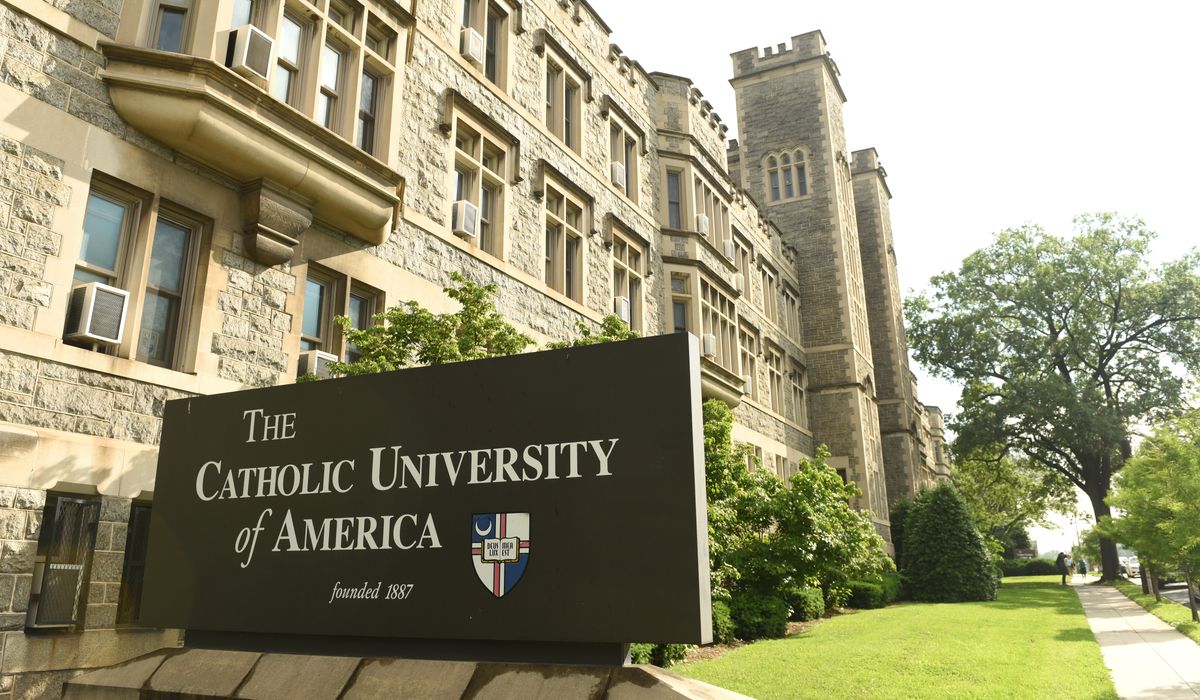


The Catholic University of America has announced it will consolidate its music drama, social work, nursing and art departments to help overcome a $30 million budget deficit.
Campus emails obtained by The Washington Times cited dwindling enrollments and tuition revenues and the Department of Education’s botched revision of the Free Application for Federal Student Aid.
The private university, located in Northeast Washington, is expected to approve the proposals at a Board of Trustees meeting in June.
“These changes we hope to adopt will be difficult in some respects,” Aaron Dominguez, CUA’s executive vice president and provost, said in a Jan. 17 email to students and faculty. “But we must adjust our current financial model to create a stronger and more sustainable organization that will allow Catholic University to navigate the increasingly dynamic and competitive landscape of Catholic higher education.”
Mr. Dominguez said the proposals would relocate the performing arts and art departments to different schools and combine the nursing and social work programs into one school after the spring semester ends. He said he was meeting with the affected schools to discuss the changes.
His message followed a Dec. 9 email to students from CUA President Peter Kilpatrick that blamed COVID-19, inflation and “the poorly redesigned federal financial aid form” for adding to the university’s financial woes.
The university president said the campus started phasing out its reliance on “financial reserves and investment payouts” to cover its bills in March 2023 and suffered additional revenue losses in the fall after failing to meet “ambitious enrollment targets.”
“For the past decade, we have bridged such gaps through transfers from financial reserves — a practice we must now cease in order to ensure long-term sustainability,” Mr. Kilpatrick added. “Like many universities nationwide, we face financial pressures that require decisive action.”
Board of Trustees Chairman Robert Neal promised his “complete and unwavering support” for the proposals in a Dec. 18 email to students, faculty and alumni.
It remains unclear how many jobs and programs are on the chopping block.
“The proposals continue to evolve through constructive conversations with stakeholders,” Karna Lozoya, a CUA spokeswoman, said in an email to The Times.
With the approval of Pope Leo XIII, U.S. bishops founded CUA in 1887 to serve as a national university for American Catholics. In 2022, the university enrolled 4,968 students and employed 455 full-time professors.
The consolidation comes amid a post-pandemic uptick in college closures and small colleges cutting low-performing humanities programs to avoid shuttering. Higher education analysts cite declining birth rates and rising costs as factors.
Dozens of tuition-dependent universities have also blamed the FAFSA fiasco for scaring off applicants.
Gary Stocker, a former university administrator who founded College Viability to evaluate campuses’ financial sustainability, estimates that 40 out of 200 struggling private colleges will shutter by the end of this semester even after cutting their budgets. He expects the closings to displace 40,000 to 50,000 students.
“Tuition discounts are currently so high that hundreds of colleges reduce their tuition just to enroll students,” Mr. Stocker said. “As a result, operating revenue is reduced while expenses continue to accelerate.”
• Sean Salai can be reached at ssalai@washingtontimes.com.
